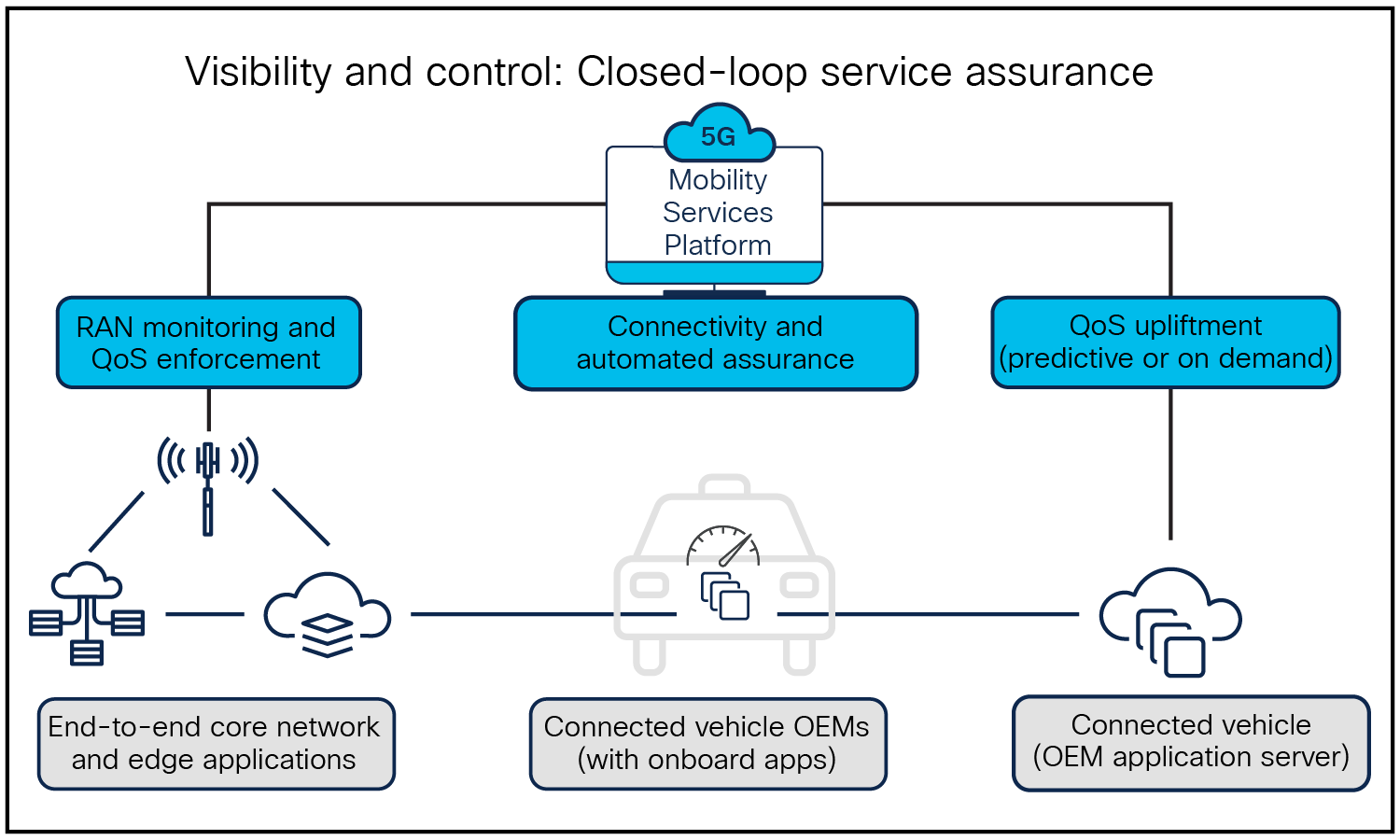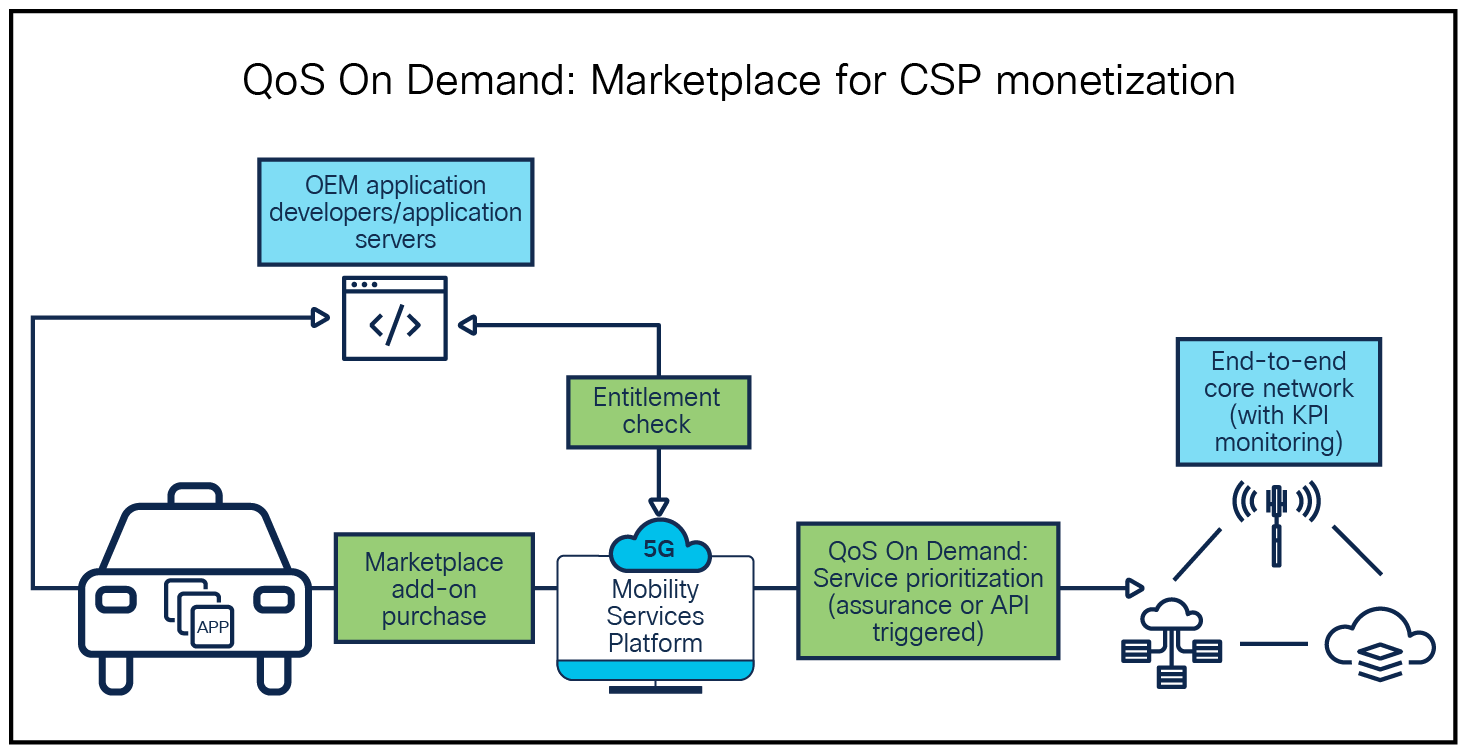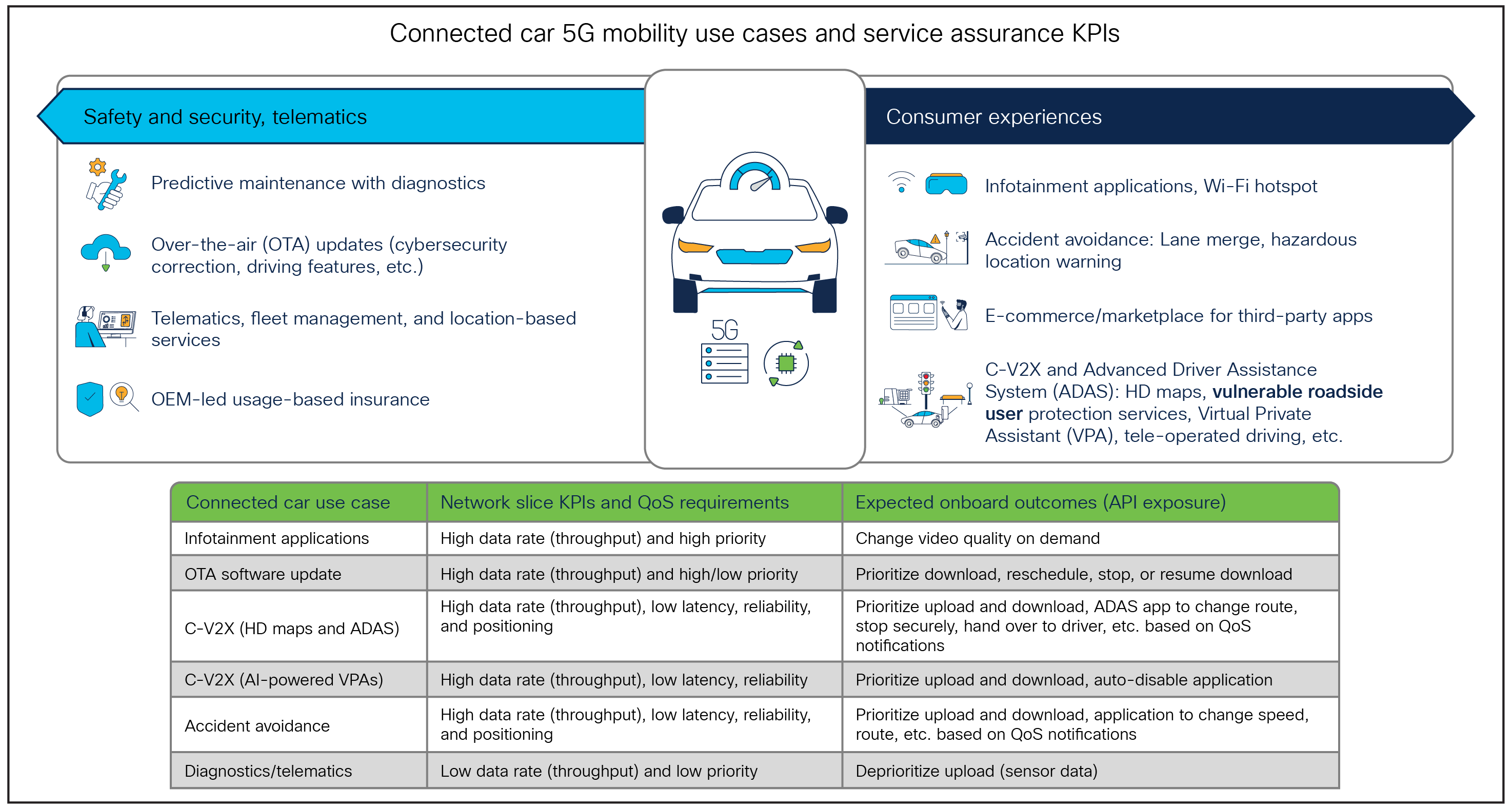Cisco IoT Control Center – Network Programmability and QoS On Demand Solution Overview
Available Languages
Bias-Free Language
The documentation set for this product strives to use bias-free language. For the purposes of this documentation set, bias-free is defined as language that does not imply discrimination based on age, disability, gender, racial identity, ethnic identity, sexual orientation, socioeconomic status, and intersectionality. Exceptions may be present in the documentation due to language that is hardcoded in the user interfaces of the product software, language used based on RFP documentation, or language that is used by a referenced third-party product. Learn more about how Cisco is using Inclusive Language.
Boost Business Performance with Complete Control: Enhance Customer Experience and Operational Efficiency
Deliver premium network service quality automatically with intelligent traffic prioritization. Leveraging Cisco® IoT Control Center, our solution lets you offer enterprise customers zero-touch network assurance that helps ensure that their critical applications perform flawlessly. With flexible subscription pricing options, you can quickly monetize this value-added managed service through Cisco’s Mobility Services Platform.
Cisco’s QoS On Demand: Intelligent network control for mission-critical applications
Network congestion can paralyze critical operations. When a major automotive OEM’s autonomous vehicles were stranded during a San Francisco concert due to network overload, the incident highlighted a crucial challenge: connected vehicles require reliable, uninterrupted cloud connectivity for real-time decision making.
Cisco addresses this challenge through QoS On Demand, an advanced feature of IoT Control Center. This solution empowers enterprises with automated, intelligent network prioritization that helps ensure consistent service quality for mission-critical applications.
For connected car manufacturers, this means:
● Assured service levels for essential vehicle operations
● Dynamic network resource allocation based on real-time needs
● Automated quality-of-service management
● Reliable connectivity for subscription-based services
Through software-defined networking and API integration, QoS On Demand automatically adjusts network resources to maintain optimal performance—even in congested environments. This enables automotive OEMs to deliver consistent service quality, protect revenue streams, and meet strict service-level agreements without manual intervention.

Transform network insights into automated service excellence with QoS On Demand
Revenue growth and market leadership
● Transform from connectivity provider to digital services enabler by offering API-driven network capabilities through a marketplace platform
Advanced service control
● Empower enterprise customers with automated, real-time control over network services through zero-touch provisioning and comprehensive visibility
Flexible monetization
● Create flexible revenue streams by packaging programmable network APIs with customizable pricing models
Ecosystem expansion
● Extend network capabilities to cloud providers and service aggregators, enabling simplified service delivery for SMBs that need automated, real-time network control
Traditionally, all applications enabled by the Communication Service Provider (CSP) network were offered over the top, thereby limiting any possibility of CSP monetization or a CSP service interception requirement. As enterprises across industry segments invest in digital transformation, there’s a rising demand for their applications to interact in real time with the underlying network. To unlock this capability, CSPs continue to invest in network APIs and in supporting infrastructure to turn the network into a monetizable platform that third-party applications can use to offer compelling outcomes.
Historically, with previous generations of mobile networks, telecom services offered a monolithic service focused on data speed and allowance as the key pricing levers. With software-defined networks, CSPs can move beyond this model by offering value-added IoT applications and/or bundled services to deliver compelling enterprise solutions and subsequently drive monetization.
A couple of key trends have emerged over the last two generational transitions that have empowered CSPs to move up the digital services value chain.
Cloud adoption. As CSPs continue to invest in network buildout, there is a massive impetus to transition to fully virtualized/cloud-native Radio Access Network (RAN) and packet core. CSPs are also considering a multicloud, hybrid deployment strategy, leading to the convergence of telco network edge and enterprise applications, which can now coexist with network functions.
Software-defined networks and decentralized architecture. In combination, software-defined networks and decentralized architecture enable compute and intelligence at the network edge to drive real-time decision making.
Network API-led programmability has its own challenges as well. Global service continuity and operator handshake are foundational requirements to honor a seamless end-user experience and adoption by an enterprise. Third-party or enterprise application developers must embrace a unified API format to enact service creation or manipulation outcomes across multiple networks, especially in the case of roaming scenarios, with support from participating CSP partners. Alternatively, enterprises must make a strategic choice to partner with a third-party platform provider (with embedded network capabilities) or directly with the CSPs to get the service control with programmability.
To overcome these challenges, key industry thought leaders in the digital service value chain are building new consortiums to standardize network APIs and service enablement (CAMARA is an API standard, for example) or announcing tech incubators that help prototype real-world scenarios.
IDC projects that telecom API revenues will reach $6.7 billion by 2028. (Source: IDC press release, June 2024).
Cisco is also expanding our global footprint with our mobility services platform, including our eSIM technology and cloud-native, converged core platform, which can also empower enterprises, Mobile Virtual Network Operators (MVNOs), and Mobile Network Operators (MNOs) to get a unified networking experience regardless of their IoT deployment footprint.
QoS On Demand: Simple setup, powerful control
Step 1: Service provider setup
Service providers begin by creating customized QoS packages in the Cisco IoT Control Center Marketplace, complete with flexible pricing options. These packages are made available to enterprise customers through Control Center, enabling immediate monetization of enhanced network services.
Step 2: Enterprise activation
Once packages are available, enterprise administrators can initiate service prioritization through either manual API requests or automated Control Center intelligence. The system continuously monitors network assurance, allowing for real-time adjustments based on performance needs.
Technical capabilities
The core service centers on QCI (QoS class identifier) uplift, while supporting additional 3GPP QoS options including allocation and retention priority, guaranteed bit rate, and aggregate maximum bit rate. To simplify deployment, Control Center offers preconfigured QoS profiles that bundle these capabilities into ready-to-use packages.
Flexible monetization
Service providers can choose from multiple pricing models to match their business needs. Options include monthly recurring charges, usage-based billing, API call volume pricing, and custom threshold-based billing. This flexibility helps ensure sustainable revenue streams while meeting diverse enterprise requirements.

Transform network services into revenue streams with QoS On Demand
QoS On Demand enables precise service prioritization across all of the use cases in the table below.
Table 1. QoS On Demand use cases
| IoT industry segment |
Use case description |
| Automotive/connected vehicles |
● C-V2X and high-definition mapping applications for advanced driver assistant systems
● Emergency services with Firmware Over The Air (FOTA) and Software Over The Air (SOTA)
|
| Video broadcasting |
● High data throughput, reliable, secure, and transitory network slice to support broadcasting use cases
|
| Smart manufacturing/private networks |
● Augmented Reality (AR) and Virtual Reality (VR) enabled headsets, new traffic control systems or high-speed robotics used in manufacturing
● Slice-based traffic prioritization to reposition manufacturing assisting robots using hyper-accurate positioning technology
|
| Smart agriculture/mining/construction |
● Autonomous operation of trucks and heavy machinery to improve safety and productivity in remote locations
|
| Healthcare |
● Secure private on-premises network slice for wearables, AR/VR headsets, and other connected assets
● Remote healthcare and telemedicine to transfer tomography files securely
|
| Public safety |
● Wireless-enabled high-definition cameras for public safety and smart grids
|
Financing to help you achieve your objectives
Cisco Capital® can help you acquire the technology you need to achieve your objectives and stay competitive. We can help you reduce CapEx. Accelerate your growth. Optimize your investment dollars and ROI. Cisco Capital financing gives you flexibility in acquiring hardware, software, services, and complementary third-party equipment. And there’s just one predictable payment. Cisco Capital is available in more than 100 countries. Learn more.

Transform connected car experiences with 5G mobility and precision KPIs
Cisco’s IoT Control Center, a cornerstone of our Mobility Services Platform, is a market-leading connectivity management platform trusted by over 250 million subscribers worldwide.
Available as an optional add-on capability, Network Programmability with QoS On Demand extends IoT Control Center’s functionality by providing CSPs with a comprehensive technology stack and user-friendly interface. Through both UI and API access, CSPs can rapidly deploy advanced mobility solutions for enterprise customers.
Our technological leadership is demonstrated through:
● Direct connectivity services to over 50% of subscribers through our advanced 5G standalone packet core
● Deep enterprise networking expertise that drives customer-focused solutions
● Seamless migration pathways from LTE to 5G, helping ensure network modernization without disruption
We develop innovative features tailored to specific industry needs, connecting people, places, and things through diverse offerings including Private 5G, mobile IoT, and consumer broadband. Our primary focus remains clear: driving increased monetization opportunities up the connectivity value chain to create new revenue streams for our customers.
Leverage Cisco to take back control of service outcomes
Are you a CSP looking to diversify your revenue stream by moving up the digital services value chain? Are you an enterprise using IoT Control Center seeking to get a differentiated QoS to offer a seamless end-user experience and drive net new subscription services? Are you an ecosystem partner (application developer, API/network aggregator) trying to drive standardization across geographies?
To learn more about Cisco IoT Control Center, please visit https://www.cisco.com/site/us/en/solutions/service-provider/networking/mobility-services-platform/index.html#tabs-35d568e0ff-item-194f491212-tab.
To learn more about Cisco Mobility Services Platform, please visit https://www.cisco.com/site/us/en/solutions/service-provider/networking/mobility-services-platform/index.html#tabs-35d568e0ff-item-194f491212-tab.
To learn more about Cisco Cloud Managed eSIM for Cisco SD-WAN, see the solution overview at https://www.cisco.com/c/en/us/solutions/collateral/internet-of-things/iot-control-center/cloud-managed-esim-sd-wan.html.
To learn more about Cisco’s on demand network slicing capability, see the solution overview at https://www.cisco.com/c/en/us/solutions/collateral/internet-of-things/iot-control-center/on-demand-network-slicing-assurance-so.html.
To learn more about the broader 5G IoT market landscape and how to unleash the power of 5G, see the white paper at https://www.cisco.com/c/en/us/products/collateral/wireless/iot-mobility-services/5g-iot-services-wp.html.